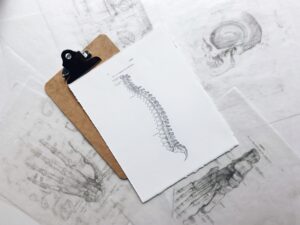A spinal disc is a small cartilaginous bag that sits between your vertebrae and prevents your spinal bones from coming together. This coming together of bone creates inflammation of the muscles and tissues around the vertebrae and can pinch nerves as well.
If you suffer from a herniated disc, that small bag has ruptured and is no longer able to provide complete protection. Herniated discs are most common in the low back because the vertebrae are larger and flatter, so a moving disc can more easily move to one side or another. If the disc just moves to the side, it’s called a bulging disc.
Both bulging and herniated discs can cause a lot of pain, but it is possible to have a herniated disc and be asymptomatic. Many who suffer a herniated disc aren’t aware of the injury until they have radiating nerve pain in their arms of legs.
If your herniation is in the upper back, the injury will likely affect one arm. Upper back herniations tend to cause a burning or sharp pain in the shoulder, neck or arm. If you notice weakness or a tremor in your arm or hand but have no pain, it can still be from a herniated disc.
A disc herniation in the low back can be diagnosed via measurements of your pain level, in what position you experience the most pain, and by checking your stride and leg length. If the disc herniation is particularly low, you may struggle to control your bowels. In the event that your back injury impacts your ability to stay continent, surgical treatment is generally recommended.
Sciatica is a condition caused by a herniated or bulging disc in the low back. When the disc bulges, it puts pressure on the large nerve that runs from the low back down your leg. Sciatic pain can be quite uncomfortable and can manifest in a number of ways. You may feel
- pain all the way down the leg
- numbness down the leg
- heat down the back of the leg
- a sensitivity when you step down with the affected foot
- a sharp, poking pain in the hip
- buttock pain
Over time, the leg affected by sciatic impingement can lose muscle strength. Your gait may change and you may limp or find that the affected foot drags. Once the impingement is released, you can get your strength back, though it may take physical therapy and will take time.
Treatment for Herniated Disc
If your herniated disc isn’t causing you any pain, it’s likely because your musculature is strong enough to be maintaining the space between your vertebrae and not pinching your nerves. Remember, discs prevent your spinal bones from coming together, causing inflammation and pinching your nerves. A strong, supple spine is less likely to lead to herniation, but it can also prevent bone collapse in the event of an herniation.
Herniated disc impact can be reduced with the guidance of a physical therapist. If you’re exercising to try to reduce disc herniation impact, such as numbness or a loss of motor control, it’s critical that you work with a personal trainer. Once a disc is damaged, you may start to alter your movement and baby the injury along, even if it isn’t causing you pain. Poor alignment in your workout will lead to an exercise program that not only won’t help, but may make things worse.
Core strength is critical to repairing disc herniation, particularly in the low back. If you’re taking yoga for flexibility, tai chi for balance or Pilates classes for strength, let your instructor know of your injury and ask for modified moves. You may not be able to do everything the rest of the class can do, but you can improve your flexibility, balance and strength with an observant instructor.
Chiropractic care is also critical for anyone suffering from disc herniation. No matter where the herniation occurs, and whether or not it’s painful, your body will act to protect the nerves and muscles impacted by the herniation. This reaction will change your alignment, and this alignment change will cause problems elsewhere as you move. Your chiropractor can help you keep the rest of your body in alignment and reduce inflammation while you work on reducing the impact of the herniated disc. Contact us at 205-637-1363 for an assessment.








